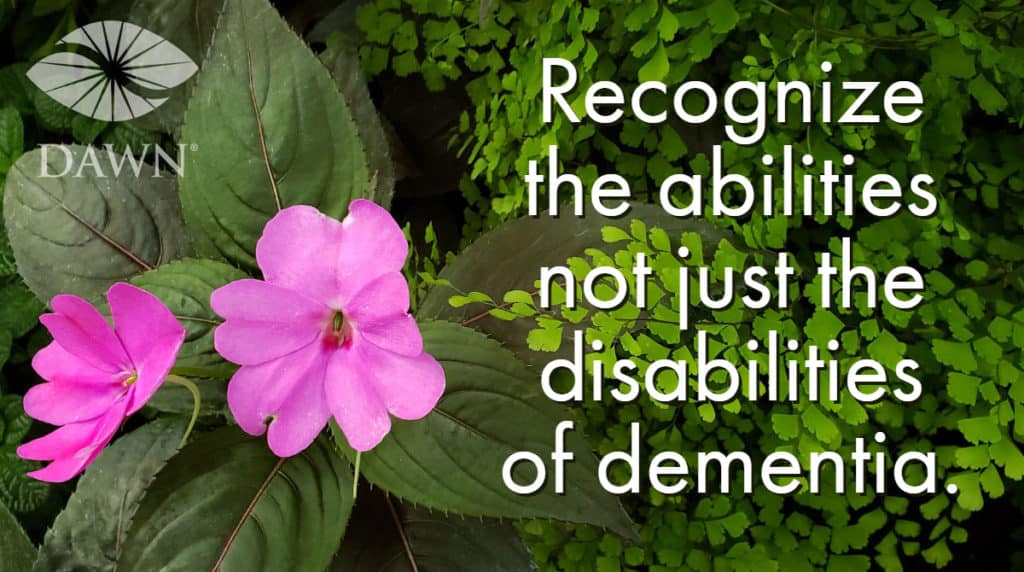As dementia caregivers, we do both ourselves and our loved ones great harm when we focus on what is lost to dementia rather than what is kept. At DAWN, we focus on our clients’ abilities, not their disabilities.
Dementia is the condition of progressive cognitive impairment, but not a condition of complete cognitive impairment—not for a very long time, if at all. When we engage with people experiencing dementia only on the level of what they cannot do, we disable them even more.
There are abilities in dementia. These are and should be recognized as strengths—the skills that people can still use to enjoy their lives. What are these skills?
The 3 strengths of Alzheimer’s & dementia
1—Our intuitive thought processes
Medical science tells us that people with dementia are losing executive thought functions as well as the ability to use judgment and make decisions. That’s a helpful diagnosis for doctors, but it doesn’t help me understand how to enjoy spending time with someone experiencing dementia. We caregivers need to think in terms of what our loved ones can and cannot do. Here, we see our clients lose the ability to see cause and effect, prioritize actions and ideas, or follow sequences (all rational thought processes) but we don’t see them lose their intuitive thought processes.
It’s intuitive thought that enables us to do the fun things in life: to be creative, enjoy beauty in all its forms, feel our own feelings and interpret the moods and feelings of those around us. Intuitive thought helps us gather and enjoy sensory data—everything we can see, hear, taste, smell and touch. When caregivers realize that their loved ones are able to do these things, they can fill their lives with sensory stimulation and beauty, while taking care of rational thinking tasks for them. The result is companionship and mutual enjoyment in the present.

2—Our experiential selves
Yes, people with dementia are losing memory, but they are not losing the ability to experience. We have both remembering selves and experiential selves.
When I am with my clients and fully present (enjoying the moment with them), we have a wonderful time. They feel valued, accepted and satisfied. It doesn’t matter that they cannot recall what we did a day, hour, or even minute later. They have a good experience and their positive mood will last.
Because I recognize that my clients continue to experience the present despite dementia, we can experience companionship and enjoy our time together. I make sure that their experiential selves are given lots of positive stimulation, and I don’t expect them to be able to recall it or explain it later.
3—The tools of mindlessness
I believe mindlessness is as valuable to those of us with dementia as mindfulness is to those of us with healthy brains. Without rational thought, people with dementia lose the ability to follow the steps of a task or tune out distractions. They become unable to focus their attention on something at will. This makes simple tasks like getting dressed or eating a meal difficult.
However, if they are still in their own homes—where they have performed a task many times before—they can use muscle memory and automatic thinking scripts (the two tools of mindlessness) to continue to function more successfully for longer.
When we are caring for people with dementia, our focus should be on what they can do, not on what they cannot do. Putting our focus on their strengths enhances companionship and lowers stress for all.
(This article was originally published March 7, 2017; latest revision: March 1, 2021.)
§
Sign up for our newsletter and free video series
Sign up for our monthly newsletter and get more advice on how to help someone experiencing dementia. As a bonus, you’ll get our free video series, “Preparing for Dementia.”
§
Web Story: “Dementia can be a beginning”
Explore the abilities of dementia & Alzheimer’s in the story here. (Tap/click on the right and left side of the image to turn the pages.)


